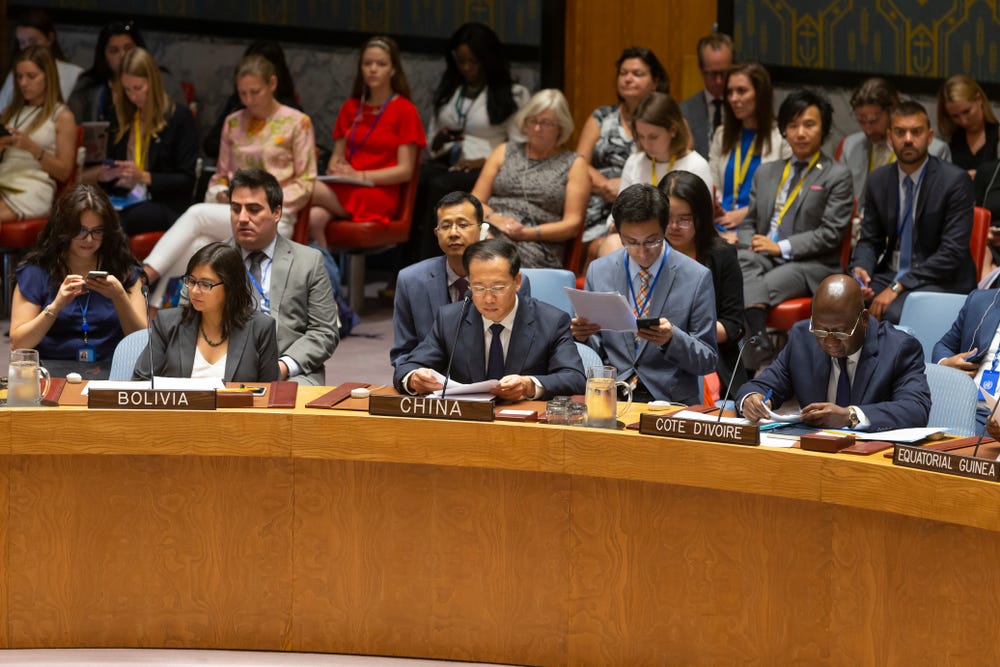E-Pluribus | May 31, 2022
When politics trumps relationships, the high (tuition) cost of DEI, and the United Nations coddles the Chinese Communist Party.
A round-up of the latest and best writing and musings on the rise of illiberalism in the public discourse:
Maya Rackoff: Friendship > Politics
As politics continues to finagle its way into more and more areas of everyday life, relationships can be collateral damage. Maya Rackoff, an intern this summer for Bari Weiss’s Common Sense writes of her experiences of the past couple of years where her zeal for social justice almost destroyed a valuable friendship.
I had grown up in a family where we were taught to respect differences of opinion. My mother, a doctor, and my father, who had immigrated to the United States from South Africa, had instilled in me a value for critical, independent thinking. Our Shabbat dinner table was always a place of political and intellectual debate. But that summer, it was impossible to do anything but feel contempt for those who disagreed with me.
One of the people who was on the other side of the divide—or so I thought—was my best friend.
She’d been raised in a more conservative household than mine, but never before had politics interfered in our friendship. That summer, though, racial politics had a way of hanging over every interaction and relationship—including ours. I had a hard time accepting that she could possibly have a problem with the woke ideology that I had subscribed to—that everyone I knew had subscribed to. Had I misjudged her? Was she actually a bad person? When she said that most, but not all, police officers were good people, I yelled at her. I said it was irrelevant that not all police were pigs. Anybody who expressed skepticism of the movement and its logic was obviously a racist. We didn’t speak for a time.
[ . . . ]
That was when all my previous disagreements with her gave way to a new anger—the anger I felt on her behalf. Before I had been ashamed that I was complicit in a racist system. Now, I was ashamed at how easily I’d given in to a worldview that seemed to me increasingly conformist and intolerant. I wondered how I could have allowed minor differences of opinion to get in the way of our friendship.
Do certain extreme differences of opinion cross irreconcilable moral boundaries? Yes. But that wasn’t the case here. My friend was not a racist or a bigot. She was kind and selfless. She was with me at my father’s funeral and supported me through my grief. She was a good person and I knew it. Everything else was beside the point.
I apologized to my best friend for my own intolerance. She forgave me immediately. It wasn’t that I regretted many of the slogans I shouted that summer—I still believe America has a long way to go to make up for past injustices and present racism. And I don’t believe it is ever acceptable to hurl slurs. People who do this should be held accountable for their wrongdoings. But I also think that my friend was on the better side of wisdom when she argued for second chances and the opportunity to learn and repent.
Read the whole thing.
John Parker: Syracuse dedicates spending $50 million on DEI as it hikes tuition
The cost of higher education has skyrocketed in recent years and talk of student loan forgiveness is once again gaining prominence in political circles. In the midst of this, Syracuse University is raising tuition once again (4.5%) while at the same time implementing a $50 million plan centered on Diversity, Equity and Inclusion, and John Parker of The College Fix reports that at least some Syracuse students are less than enthusiastic.
The university will raise its full-time undergraduate tuition 4.5 percent to $58,440 for the 2022-23 academic year, according to an April 19 news release.
However, the tuition hike also coincides with the launch of Syracuse’s new Diversity Equity and Inclusion plan, slated for 2021 through 2026.
The plan, under its “Faculty Diversity and DEIA Curriculum Innovation” section, allocates a $50 million investment for faculty retention and diversification in hiring, a $1 million dollar budget for 2021, and $2 million dollar budget for 2022 and beyond.
[ . . . ]
It also aims to increase diversity in students, staff and faculty recruitment, and to build DEI-related “institutional infrastructure”; that will include “university-provided professional DEIA development for faculty, staff and students where ‘development’ is understood as ongoing and ‘training’ is understood as one-off.”
For faculty retention strategies, the plan includes the institution of “multicultural affairs offices, women’s studies departments, queer theories courses, unconscious bias trainings, and social-justice-oriented excursions.”
It aims to “infuse/integrate DEIA into all activities and structures of Syracuse University” and to “decolonize (modernize to be inclusive) all activities and structures of Syracuse University.”
Read it all.
Josh Rogin: How the U.N. became a tool of China’s genocide denial propaganda
The stated purpose of the United Nations is fostering “international peace and security, developing friendly relations among nations and promoting social progress, better living standards and human rights.” Josh Rogin, however, writes for the Washington Post that in the case of China, the UN is fostering “peace” at the expense of China’s Uyghurs by helping China deflect criticism of and accountability for its genocide and abuse of human rights.
After a two-day visit to the Xinjiang region, Bachelet failed to clearly condemn the government’s campaign of repression there, which the Uyghur community and two successive U.S. administrations have said amounts to genocide. She acquiesced to Beijing’s framing of the issue there as “counterterrorism and radicalization.” She also reported without skepticism that Chinese officials in Xinjiang claim to have closed the “reeducation centers” where an estimated 2 million innocent people have been imprisoned.
“She has failed her mandate,” Dolkun Isa, the president of World Uyghur Congress, said Saturday. “The Uyghur community deserves accountability more than ever.”
Perhaps Bachelet was too busy hobnobbing with Chinese officials to notice that a huge cache of leaked documents from the Xinjiang police files were released last week. They show the faces of thousands of prisoners thrown into the camps for such “crimes” as traveling abroad, studying Islam or growing a beard. Critics say that Bachelet allowed the Chinese authorities to stage-manage her trip so thoroughly that Beijing will be able to use it to deflect responsibility for its atrocities.
“Nothing that we’ve seen from the high commissioner’s trip to China dispels our worry that this will be used as a massive propaganda victory for the Chinese government,” Charbonneau told me in an interview. “Bachelet needs to work to put an end to, and not enable, the perception that the U.N. is letting China get away with massive abuses at no cost.”
Read it all here.
Around Twitter
Via Glenn Greenwald, transgender activists continue to try to shape the women’s sports narrative:
Via Jesse Singal, the American Medical Association is promoting a poor study on gender-affirming care for children:
And finally, via Heterodox Academy and the Chronicle of Higher Education: is “access to education” not a “privilege” worth mentioning?












